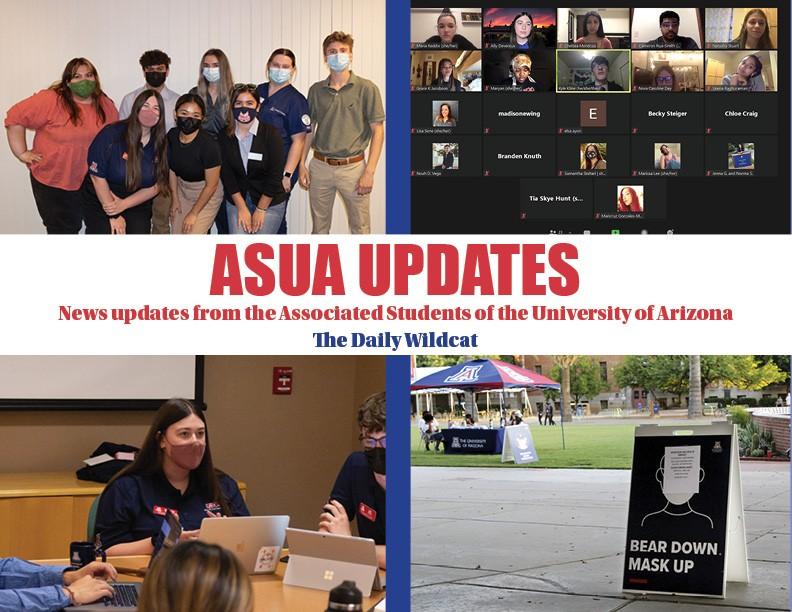The Associated Students of the University of Arizona, the university’s undergraduate student governing body, met on Wednesday, Oct. 6, to discuss a video on campus containing racist language.
The meeting was called to order at 7:07 p.m. and adjourned at 8:07 p.m. The senate gathered in the Madera room of the Student Union Memorial Center and over Zoom.
According to ASUA’s post-meeting minutes, two were marked absent during roll call: Ally Devereux, ASUA executive vice president, and Kyle Kline, ASUA administrative vice president.
Racism on Campus
The senate addressed a video of white students using racist language toward a student of color on campus from this semester. They talked about the next steps necessary to condemn the actions.
“This issue needs a larger solution,” said Lady Dorothy Elli, an at-large senator. The senate agreed that while social media posts bring awareness, they are not the best long-term solution to problems with racism.
They decided that finding resources to combat and report racism already established on campus, like the Bias Education and Support Team, and spreading awareness of them should be the first course of action.
Louise Lalescu, senator for the College of Science, said, “people that are actually racist won’t grow from being called out … this comes from a place of ignorance, and you work on informing people of their ignorance.”
The senate said they want to meet with the Office of Diversity & Inclusion and Ivy Banks, associate vice provost for Diversity & Inclusion, to learn what resources they have to offer students. They want to continue promoting the message through in-person events throughout the year.
An appropriate response needs to be developed because students are still protected under the First Amendment.
“Public universities still have to adhere to freedom of speech. Even if it’s so despicable and disgusting, they still have that right, and you can’t do anything about it,” said Noah Vega, ASUA student body president.
UA Foundation yet to commit to divestment plan
Vega and Kline met with the University of Arizona Foundation on Tuesday, Oct. 5, to be updated on the UAZ Divest resolution and changes happening in the near future.
The UA Foundation said that no final commitment will be made about the track record for the investment plan, according to Vega thus far.
After the meeting, Vega said, “[the fossil fuel companies] have already invested a lot of money into UA, and the Arizona Foundation realizes it would be a financial mistake to take that away.”
The expected return on investment helps provide millions in funding to the university, which goes back to the students through scholarships, so funding cannot be pulled immediately. The full divestment will likely take years to complete.
“I am very confident in saying that this is the same case across the country,” Vega said. “You want to stop the investment immediately, but that comes with reducing the amount of scholarships for students.”
Vega said no new contracts were pledged to fossil fuels in the last two to three years, so the approximate amount of time it will take to divest is seven years.
“The goal is to meet with the board of trustees, sit down and talk to them about the points we’re trying to make and get them to make a commitment. The issue is that the board of trustees switch around, so one group could tell you they’re on board with this and the next won’t agree,” Vega said.
Masks and fees at the Student Recreation Centers
Vega met with Troy Vaughn, director of Campus Recreation, for an update on the mask mandate and the health and recreation fee increase.
Vaughn reported to Vega that there are no COVID-19 outbreaks on campus being traced back to the Rec Center, and that if the number of cases continues to go down, the mask mandate will be lifted.
There was an outbreak of COVID-19 with around 16 student employees at the Rec Center, he said, but they finished their quarantine and there have not been any positive cases since.
Starting in 2022, students will pay $600 for the health and recreation fee. Current students will continue to pay $425 for the fee because of the tuition lock.
The fee funds medical services, Counseling and Psychological Services and Rec Center facilities among other programs provided to students.
Appropriations board in flux
The senate discussed updating the bylaws of the appropriations board. They want to change the bylaws to lower the number of members on the board from seven to three.
There are not enough applicants to start conducting business and funding clubs, and lowering the number of people would allow the appropriations board to do that.
“There would need to be significant changes. The whole document needs to be renewed,” said Ex Officio Assistant Dean Sylvester Gaskin. It has not been updated in a few years.
Lauren Heath, senator for the College of Architecture, Planning and Landscape Architecture, served on the appropriations board and then as a club advocate last year. She leads the board now.
“It was just very difficult to get people involved on campus … I hope to see people collaborating with each other because if we are able to provide more funding to more students we will be able to connect the community once again,” Heath said.
Notable Mentions
Elli said the Asian Market Night will be pushed back to next semester after meeting with Gaskin and Kendra Martinez, Arts, Culture and Entertainment director of the Wildcat Events Board.
They agreed it would be appropriate since Asian American and Pacific Islander Heritage Month occurs in the spring. They want to incorporate the Student Union Memorial Center and vendors from the Tucson area.
Spring Fling is scheduled to happen April 8-10. This is the first time in two years that it will happen because of COVID-19. Last year, goodie bags were distributed to students in lieu of Spring Fling being in-person.
Follow Jane Florance on Twitter








